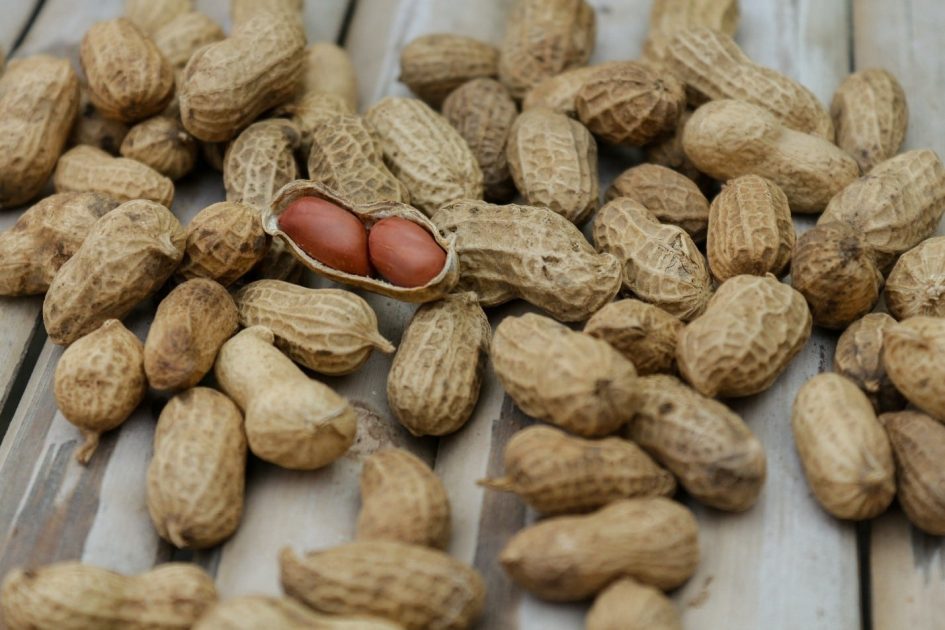

Dogs and Peanuts – All You Need to Know
Some foods just don’t fare well with dogs even when they are safe to eat, and peanuts are one of these foods. There are a few important things every pet owner should know about peanuts before they feed them to their pet dog.
Ever found your dog sniffing the peanut butter jar in the kitchen or looking at your peanut butter toast with those big, dreamy eyes?
All it takes is a single lick of a spoon smeared with peanut butter for your furry friend to get hooked on this delicious treat!
Since the key ingredient in it is peanuts, most pet owners naturally assume that peanuts are safe for their canine companion.
But can dogs eat peanuts?
Well, they can, but it isn’t that simple. Some foods just don’t fare well with dogs even when they are safe to eat, and peanuts are one of them. There are a few important things every pet owner should know about peanuts before they feed them to their pet dog.
1. The Benefits of Peanuts for Dogs
Peanuts make a delicious and healthy snack for dogs, given how they are loaded with essential nutrients and vitamins. Peanuts contain healthy fats, vitamins E and B6, protein, and niacin, making them a great option for your furry friend.
However, peanuts are only good and beneficial for your pet as long as they are unsalted, raw, unseasoned, and have the shells removed.
Also, before feeding your dog peanuts, make sure to consult your veterinarian because some dogs do have allergies to certain kinds of human foods, so it’s better to be safe than sorry.
2. Possible Risks and Side Effects of Peanuts for Dogs
The good news definitely is that peanuts aren’t toxic for dogs.
On the downside, though, they do come with possible risks and side effects, so you might want to watch out before feeding this snack to your dog because not all peanuts are created equal.
There are many ways in which peanuts can be dangerous for your pet, potentially even risking their lives.
2.1 The Risk of Added Ingredients
When eating peanuts as snacks, most people get the salted or flavored variety. While you might enjoy eating them, they certainly aren’t good for your dog.
Salted and flavored peanuts contain added ingredients that are a serious health hazard for your pet. For instance, salted peanuts consist of sodium, which can lead to a case of sodium ion poisoning in case of high consumption. Not just that, but flavored or seasoned peanuts such as honey or caramel might also have artificial sweeteners that can be quite dangerous for your dog’s system because they can’t process and digest those chemicals.
Other than these, another very important ingredient to watch out for in peanuts, as well as peanut butter, is called xylitol.
This is a sugar substitute that is found in many foods and safe for humans but extremely toxic for your four-legged companion. If your pet consumes even a pea-sized amount of xylitol, it can go into hypoglycemia, a state in which there’s a dangerous drop in the blood sugar levels that can result in liver failure, seizures, and even death if immediate veterinary care is not provided.
Some key signs of xylitol toxicity in dogs that you ought to know include: panting, disorientation, seizures, and collapsing.
2.2 Allergic Reactions
There are times when dogs develop allergies to different types of foods that also include peanut allergies.
A peanut allergy in dogs can range from mild to severe depending on the number of peanuts that is consumed.
There are several signs of peanut allergies in dogs that you should watch out for, such as: swelling around the mouth region, sneezing, coughing, hives, and troubles in breathing. In severe cases, your pet can even suffer from anaphylaxis, an extreme allergic reaction that can potentially be life-threatening.
If you feed your dog peanuts and notice any of these symptoms, stop giving them peanuts and immediately consult the veterinarian to figure out what to do next and whether if they require veterinary attention.
2.3 High Fat Content
Peanuts are high in their fat content, and consuming too much fat can result in many health concerns in a dog, such as an upset stomach. In worst cases, it can even cause pancreatitis.
Consuming large amounts of fat is so risky for human beings, too, so you can only imagine the amount of harm that it can cause to an animal.
2.4 Serious Choking Hazard
Dogs often have a tendency to swallow small foods whole without chewing them properly, and given the size of peanuts, your dog is likely to swallow it whole.
This presents a serious choking hazard not just because of the size but also because most dogs have a habit of gobbling up small foods in one straight go. This increases the risk of choking to a large extent.
Furthermore, peanut shells are super risky for your furry friend because their digestive systems simply just can’t handle them. So, even if you do feed a peanut or two to your pet, make sure that the shells are completely removed.
3. Final Word
So, can dogs eat peanuts?
Yes, they can, but only in moderation and if they are unsalted, unflavored, and free of shells.
However, as a pet owner, you must ask yourself if it’s even worth it to feed your pet something that comes with so many health risks, concerns, and side effects.
If your dog absolutely loves peanuts, you can simply offer them a lick of peanut butter! The latter is much safer to feed your furry friend since there’s no risk of choking involved.
Make sure to check the ingredient label and that it doesn’t contain added ingredients like sodium, xylitol, artificial sweeteners, and flavoring.
When feeding your pet something like peanuts, the ultimate rule of thumb is portion control.
Never overdo it and feed it to them in moderation. Give your dog peanuts or peanut butter as an occasional treat, and don’t turn it into a daily thing.
If you have any questions, concerns, or you require information on what to feed your pet, it is best to consult your veterinarian, as they will be able to guide you in the best possible way on the matter.
Discover how to create a joyful, healthy home for your pet.
Subscribe to your weekly rundown of practice, real life ideas and training tips straight to your inbox.


